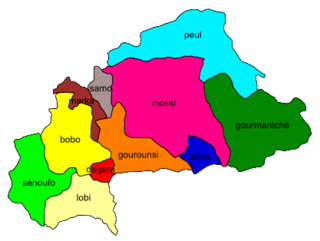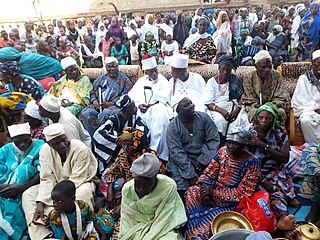Related Research Articles

Hausa is a Chadic language that is spoken by the Hausa people in the northern parts of Nigeria, Ghana, Cameroon, Benin and Togo, and the southern parts of Niger, and Chad, with significant minorities in Ivory Coast. A small number of speakers also exist in Sudan.

Ga is a Kwa language spoken in Ghana, in and around the capital Accra, by the Ga people. There are also some speakers in Togo, Benin and Western Nigeria. It has a phonemic distinction between three vowel lengths.

The Mande languages are a group of languages spoken in several countries in West Africa by the Mandé peoples. They include Maninka (Malinke), Mandinka, Soninke, Bambara, Kpelle, Jula (Dioula), Bozo, Mende, Susu, and Vai. There are around 60 to 75 languages spoken by 30 to 40 million people, chiefly in Burkina Faso, Mali, Senegal, the Gambia, Guinea, Guinea-Bissau, Sierra Leone, Liberia, Ivory Coast and also in southern Mauritania, northern Ghana, northwestern Nigeria and northern Benin.

Kwara State is a state in Western Nigeria, bordered to the east by Kogi State, to the north by Niger State, and to the south by Ekiti, Osun, and Oyo states, while its western border makes up part of the international border with Benin Republic. Its capital is the city of Ilorin and the state has 16 local government areas.
Bozo is a Mande language spoken by the Bozo people of the Inner Niger Delta in Mali. For Fishing, many Bozo are also found in other West African countries where there are Rivers and Dams, such as Nigeria, Burkina Faso and the Ivory Coast. According to the 2000 census, the Bozo people number about 132,100. Bozo is considered a dialect cluster, but there is a quite a bit of diversity. Ethnologue recognises four languages on the basis of requirements for literacy materials. Bozo is part of the northwestern branch of the Mande languages; the closest linguistic relative is Soninke, a major language spoken in the northwestern section of southern Mali, in eastern Senegal, and in southern Mauritania. The Bozo often speak one or more regional languages such as Bambara, Fula, or Western Songhay. The language is tonal, with three lexical tones.

There are over 525 native languages spoken in Nigeria. The official language and most widely spoken lingua franca is English, which was the language of Colonial Nigeria. Nigerian Pidgin – an English-based creole – is spoken by over 60 million people.
Bissa is a Mande ethnic group of south-central Burkina Faso, northeastern Ghana and the northernmost tip of Togo. Their language, Bissa, is a Mande language that is related to, but not the same as, a cluster of languages in the old Borgu Kingdom area of Northeast Benin and Northwest Nigeria, including Busa, Boko, and Kyenga. An alternate name for the Bissa is Busansi or Busanga which is used by the Mossi people.

Karai-karai is a language spoken in West Africa, most prominently North eastern Nigeria. The number of speakers of Karai-karai is estimated between 1,500,000 to 1,800,000 million, primarily spoken by the ethnic Karai-Karai people. It is an Afro-Asiatic language spoken principally in Nigeria with communities in Bauchi State, Yobe State, Gombe State and other parts of Nigeria. Many Karai-karai words share a common origin with the Northwest Semitic languages of Hebrew and Arabic. The Karai-karai language is most closely related to the Ngamo and Bole languages which are both considered derivatives of the Karai-karai language.
Busa, or Bisã, is the Mande language of the former Borgu Emirate in northwestern Nigeria and northern Benin. It is called Busanci in Hausa, and has also been called Zugweya.

Bissa, is a Mande ethnic group of south-central Burkina Faso, northeastern Ghana and the northernmost tip of Togo. Their language, Bissa, is a Mande language that is related to, but not the same as, a cluster of languages in the old Borgu Kingdom area of Northeast Benin and Northwest Nigeria, including Busa, Boko, and Kyenga. An alternate name for the Bissa is Busansi which is used by the Mossi people and Kusasi people or Busanga.

The Bariba people, self designation Baatonu, are the principal inhabitants of Borgou and Alibori Departments, Benin, and cofounders of the Borgu kingdom of what is now northeast Benin and west-central Nigeria. In Nigeria, they are found spread between western Kwara State and the Borgu section of Niger State. There are perhaps a million Bariba, 70% of them in Benin, where they are the fourth largest ethnic group and comprise approximately 1/11 of the population (9.2%).
Kala/Balge is a Local Government Area of Borno State, Nigeria. It is the easternmost LGA of Nigeria. It has its headquarters in the town of Rann.
Bariba, also known as Baatonum, is the language of the Bariba people of Benin and Nigeria and was the language of the state of Borgu. The native speakers are called Baatombu, Barba, Baruba, Berba and a number of various other names and spellings.
Shanga is a Mande language of Nigeria.

Dendi is a Songhay language used as a trade language across northern Benin (along the Niger River. It forms a dialect cluster with Zarma and Koyraboro Senni but it is heavily influenced by Bariba.

Tammari is a language which is spoken in Benin and Togo. It is also known as Ditammari. The Tammari people, who live in Benin and Togo, mostly speak the language. There are about 47.000 speakers. About half live in Togo, the other half in Benin. Ditammari is one of the Gur languages.
Hyam is a regionally important linguistic cluster of Plateau languages in Nigeria. Hyam of Nok is the prestige dialect. Writing the sociolinguistics of Hyam, Blench treats Sait, and Dzar as distinct varieties, and notes that Yat and Ankung may be viewed as separate languages, however, Hayab (2016) presents a differing opinion arguing that it is Ankung, a language called Iduya, that is not mutually intelligible to Hyam. Meanwhile, Hyam, which is spoken by the Ham people of Nigeria, popularly known as 'Jaba' in a recent study by Philip Hayab, a native of the area and a linguist who carried out in-depth research into the language, reveals that 'Jaba' has a Hausa etymology and is derogatory and should be discarded.
The Ayizo languages (Ayizɔ) are Gbe languages spoken in Benin. They are Ayizo, Kotafon, and Gbesi.
The Eastern Mande languages are a branch of the Mande languages spoken in seven areas: northwest Burkina Faso, the border region of northern Benin and Nigeria, and one language, Bissa, also spoken in Ghana, Togo, and Ivory Coast and the Samo languages also spoken in Mali.
References
- ↑ Boko at Ethnologue (18th ed., 2015) (subscription required)